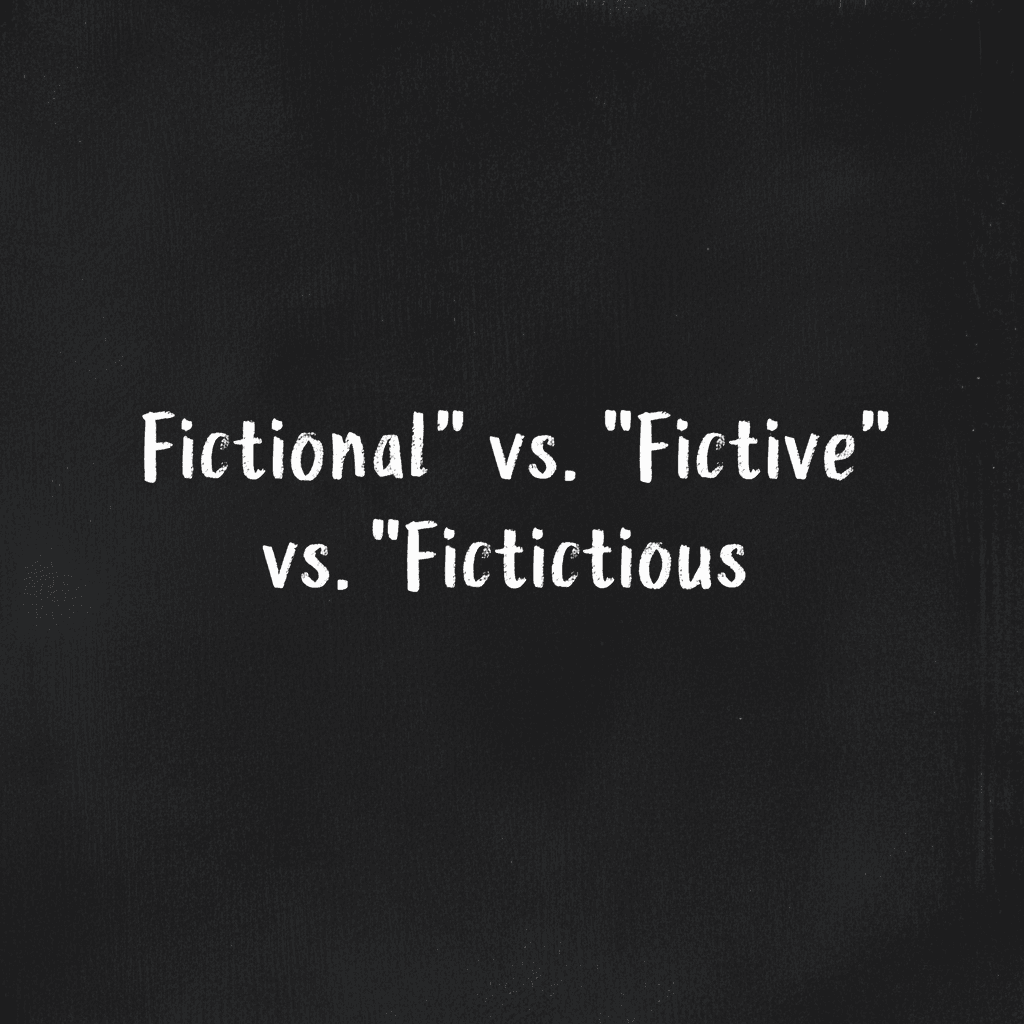Fictional vs. Fictive vs. Fictitious: What’s the Difference?
 All three words relate to things that are not real, but they are used in different contexts:
All three words relate to things that are not real, but they are used in different contexts:
Fictional → ✔ created for stories, novels, movies
Fictive → ✔ theoretical, imaginary, used in academic/literary contexts
Fictitious → ✔ false, fake, not genuine (often used for lies or fraud)
They overlap in meaning, but each has a distinct tone and usage.
1. Fictional
Meaning
Fictional refers to something created for storytelling — characters, places, events, or worlds found in books, movies, or TV shows.
Use it when discussing fiction, literature, entertainment, or invented narratives.
Examples (10 total)
- Sherlock Holmes is a fictional detective.
- The movie takes place in a fictional city.
- She writes fictional stories for children.
- The fictional world felt incredibly detailed.
- They created a fictional character for the ad campaign.
- The book includes fictional diary entries.
- Hogwarts is a famous fictional school.
- He prefers reading fictional adventures.
- The show is based on a fictional universe.
- Her novel features fictional versions of real people.
🧠 Tip:
If it relates to books, movies, or made-up worlds, choose fictional.
2. Fictive
Meaning
Fictive is more academic and literary.
It describes something imagined, theoretical, or constructed, especially in discussions of art, psychology, anthropology, narrative theory, or philosophy.
It’s not commonly used in everyday speech.
Examples (10 total)
- The researcher studied fictive kinship structures.
- The theory explains how fictive worlds shape identity.
- The artist explored fictive space in her paintings.
- Anthropologists analyze fictive family roles.
- The class discussed the nature of fictive realities.
- His writing blurs the line between real and fictive elements.
- The film plays with fictive time and memory.
- Scholars debated the use of fictive imagination.
- The novel’s fictive framework challenges readers.
- The study examined fictive narratives in culture.
🧠 Tip:
Use fictive when writing academically about concepts, theories, narratives, or constructed realities.
3. Fictitious
Meaning
Fictitious refers to something false, fake, invented, or not genuine — often used in legal, official, or factual contexts.
It can describe fake names, invented claims, false information, or fraud.
Examples (10 total)
- He used a fictitious name when checking in.
- The company filed fictitious expense reports.
- The story was based on fictitious claims.
- She gave a fictitious address.
- The witness provided fictitious details.
- The police discovered the documents were fictitious.
- He was charged with creating fictitious transactions.
- The rumor was completely fictitious.
- They tracked the money to a fictitious account.
- The lawsuit involved fictitious business entities.
🧠 Tip:
If it means fake, fraudulent, or not true, use fictitious.
4. Quick Comparison Table
| Word | Meaning | Common Use | Example |
|---|---|---|---|
| Fictional | invented for storytelling | books, films, creative writing | fictional characters |
| Fictive | imagined; theoretical | academic/literary theory | fictive worlds |
| Fictitious | false or fake | legal, official, fraud | fictitious names |
5. How to Remember
👉 Fictional → storytelling
👉 Fictive → theory & analysis (scholarly)
👉 Fictitious → fake or fraudulent
Memory trick:
If it sounds like fiction, it’s probably fictional.
If it sounds academic, it’s probably fictive.
If it sounds suspicious, it’s fictitious.
6. Common Mistakes
❌ Using fictitious to talk about fantasy novels
✔ Use fictional
❌ Calling academic concepts “fictional”
✔ Use fictive
❌ Using fictive in casual writing
✔ It often sounds overly technical
Writing More Naturally
Choosing between fictional, fictive, and fictitious can affect tone and clarity. If you want your writing to feel natural and avoid confusing or overly academic wording, an AI humanizer can polish your sentences and ensure the right word fits the right context.
FAQs
1. Do these words mean the same thing?
They all relate to “not real,” but they apply to different contexts.
2. Which one should I use for characters in a story?
Use fictional.
3. Which one refers to fake names or false information?
Use fictitious.
4. When should I use “fictive”?
Use it in academic or literary theory contexts.
Practice: Choose the Correct Word
(Answers are at the end.)
- The author created a __________ world full of magic.
- He was arrested for using a __________ passport.
- Scholars discussed the novel’s __________ structure.
- The film is set in a __________ country.
- The witness gave __________ details about the event.
- Anthropologists study __________ family relationships.
- She wrote a __________ version of her childhood.
- The rumor online was completely __________.
- His artwork explores __________ space and identity.
- They built a __________ character for the advertisement.
Answers
- fictional
- fictitious
- fictive
- fictional
- fictitious
- fictive
- fictional
- fictitious
- fictive
- fictional
